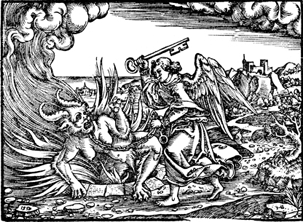The Myth of Binding Satan
 As a Christian with Pentecostal/Charismatic background I have been raised to the practice of binding Satan during intercessory prayer. In prayer meetings, right after we confess our sins, (something that we often do first), then the prayer gets louder especially when we start saying, “I bind you Satan!” Sometimes some of us even go with the Old English version of “I biiiiind theeee Satan!” with matching stomping of the feet.
As a Christian with Pentecostal/Charismatic background I have been raised to the practice of binding Satan during intercessory prayer. In prayer meetings, right after we confess our sins, (something that we often do first), then the prayer gets louder especially when we start saying, “I bind you Satan!” Sometimes some of us even go with the Old English version of “I biiiiind theeee Satan!” with matching stomping of the feet.
But as I grow from being just a mere attendee to being a more serious student of God’s Word I came to a painful realization that if we are to consider the whole Pentecostal/Charismatic belief system it, would be absurd to bind Satan. Here’s why.
The most common Eschatological (End-Time) belief in the Pentecostal/Charismatic movement is Premillennialism, that is, the belief that the corporeal return of Christ to reign a thousand years will be preceded by the Seven-Year Tribulation period. This belief relies on to the literal and grammatical interpretation of Revelation 4-19 as a writing of “what will take place later” (Rev. 1:19), that is, a foretelling of events that will unfold at the beginning of the Tribulation Period up to the return of the Lord Jesus Christ.
When Christ comes, the first order of business is to vanquish the unholy alliance of apostates led by the Antichrist (Rev. 19:15-21), “And” writes John in Rev. 20:1-3 after seeing the Apocalyptic visions, Satan will be bound a thousand years:
“And I saw an angel coming down out of heaven, having the key to the Abyss and holding in his hand a great chain. He seized the dragon, that ancient serpent, who is the devil, or Satan, and bound him for a thousand years. He threw him into the Abyss, and locked and sealed it over him, to keep him from deceiving the nations anymore until the thousand years were ended. After that, he must be set free for a short time.” Rev. 20:1-3
I propose therefore, that if a Pentecostal aims to stand on a belief that is non self-contradictory, he will have to quit this extra-biblical practice of binding of Satan.
Why not just quit being a Premillennialist instead? That is quite radical and I am afraid that is not going to be a viable choice either given that Amillennialism espouses the belief that Satan has already been bound to certain extent.
And so if Premillennialism is to be held true, there is simply no magical spell that could further bind Satan at this time, God will keep His own time table (Mat 8:29; Acts 1:7; 1Cor 4:7), and it will literally take an angel from heaven to totally bind and lock him up in the Bottomless Pit.
Now that we know the myth, what should we do instead?
- Submit yourselves to God, resist the Devil, and he will flee from you (Jas 4:7).?
- Stand firm in truth, in righteousness, in faith, in the Gospel, in salvation, in the Word of God, and in prayer (Eph 6:10-20).
The Lord Jesus gave us His example in Mat. 4:1-11. Very well grounded in the Word of God, He resisted not only the Devil but also the lust of the flesh,?the lust of the eyes, and the pride of life.?(1Jn 2:16).
What about the binding and loosing in Mat. 12:28-29; 16:19; 18:18?
- Mat. 12:28-29 is about casting out demons. Jesus refutes the allegation of the Pharisees that he was casting out demons by the power of Satan. Jesus tells them that human armies don’t even resort to self-defeating strategies as they allege spiritual forces do. Instead, they break through the enemy fortified line and debilitate their enemy thus the use of the word “bind the strong man” (cf. Lk. 11:21-22).
- Mat. 16:19 is about the apostolic authority in relation to church growth. They exercised this type of authority when they settled a doctrinal dispute that threatened the young and growing church in Acts 15.
- Mat. 18:18 is about the authority of the church to settle brotherly disputes and to discipline its members. Read this verse beginning at verse?15 through verse 20. Take note of the connectives such as “if” (condition), “but if”, “again” (reiteration) and “for” (the reason being). These?”connectives link the ideas arbitrarily divided by verses to form one coherent thought.
Recent Comments